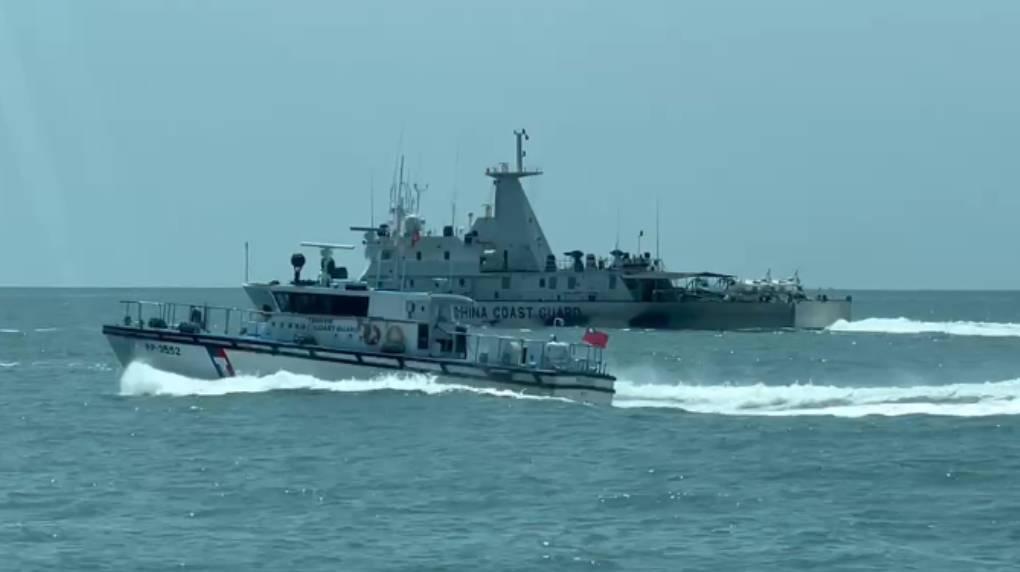A French national television network on Sunday aired a documentary highlighting China's expansionist ambitions in the South China Sea and how Taiwan and the Philippines are responding to the "unprecedented" threat.
The 80-minute documentary titled Red Alert in the South China Sea (Alerte rouge en mer de Chine) and which aired on the privately owned TV channel M6 said that "the threat of invasion is unprecedented" and Taiwan has entered "a long-term state of alert, with people actively preparing for a potential attack."
It also said that more than 80 percent of Taiwanese oppose unification with Beijing, and that "independence" is the consensus view.

Photo courtesy of the Coast Guard Administration
The documentary said that Beijing's desire to annex Taiwan is driven by history and "nationalism," as well as the geopolitical goal of securing unimpeded access to the Pacific Ocean.
The filmmakers interviewed several Taiwanese figures, including Major General Tung Chi-hsing (董冀星), director of the Ministry of National Defense’s joint operations planning division, who said that China's threat to Taiwan is "increasing."
The documentary showed satellite images of scale replicas of the Presidential Office Building and surrounding streets in Taipei that the Chinese government has built in Inner Mongolia, apparently to train ground forces for a potential decapitation strike against Taiwan's democratically elected leadership.
Chinese Nationalist Party (KMT) Department of International Affairs director Alexander Huang (黃介正) was also quoted in the film as saying that his party tries to maintain communication with Beijing as Taiwan is "not ready for war."
Taiwan needs to buy time to reform the military, acquire new weaponry and conduct training, Huang said.

Eight restaurants in Taiwan yesterday secured a one-star rating from the Michelin Guide Taiwan for the first time, while three one-star restaurants from last year’s edition were promoted to two stars. Forty-three restaurants were awarded one star this year, including 34 in Taipei, five in Taichung and four in Kaohsiung. Hosu (好嶼), Chuan Ya (川雅), Sushi Kajin (鮨嘉仁), aMaze (心宴), La Vie by Thomas Buhner, Yuan Yi (元一) and Frassi in Taipei and Front House (方蒔) in Kaohsiung received a one-star rating for the first time. Hosu is known for innovative Taiwanese dishes, while Chuan Ya serves Sichuan cuisine and aMaze specializes

Taitung County is to launch charter flights to Malaysia at the end of this year, after setting up flights to Vietnam and Thailand, the Taitung County Government said yesterday. The new charter flight services, provided by low-cost carrier Batik Air Malaysia, would be part of five-day tour packages for visits to Taitung County or Malaysia. The Batik Air charter flight, with about 200 seats, would take Malaysian tourists to Taitung on Dec. 30 and then at 12:35pm return to Kuala Lumpur with Taiwanese tourists. Another charter flight would bring the Taiwanese home on Jan. 3 next year, arriving at 5:30pm, before taking the

STATS: Taiwan’s average life expectancy of 80.77 years was lower than that of Japan, Singapore and South Korea, but higher than in China, Malaysia and Indonesia Taiwan’s average life expectancy last year increased to 80.77 years, but was still not back to its pre-COVID-19 pandemic peak of 81.32 years in 2020, the Ministry of the Interior said yesterday. The average life expectancy last year increased the 0.54 years from 2023, the ministry said in a statement. For men and women, the average life expectancy last year was 77.42 years and 84.30 years respectively, up 0.48 years and 0.56 years from the previous year. Taiwan’s average life expectancy peaked at 81.32 years in 2020, as the nation was relatively unaffected by the pandemic that year. The metric

Taiwan High Speed Rail Corp. (THSRC) plans to ease strained capacity during peak hours by introducing new fare rules restricting passengers traveling without reserved seats in 2026, company Chairman Shih Che (史哲) said Wednesday. THSRC needs to tackle its capacity issue because there have been several occasions where passengers holding tickets with reserved seats did not make it onto their train in stations packed with individuals traveling without a reserved seat, Shih told reporters in a joint interview in Taipei. Non-reserved seats allow travelers maximum flexibility, but it has led to issues relating to quality of service and safety concerns, especially during